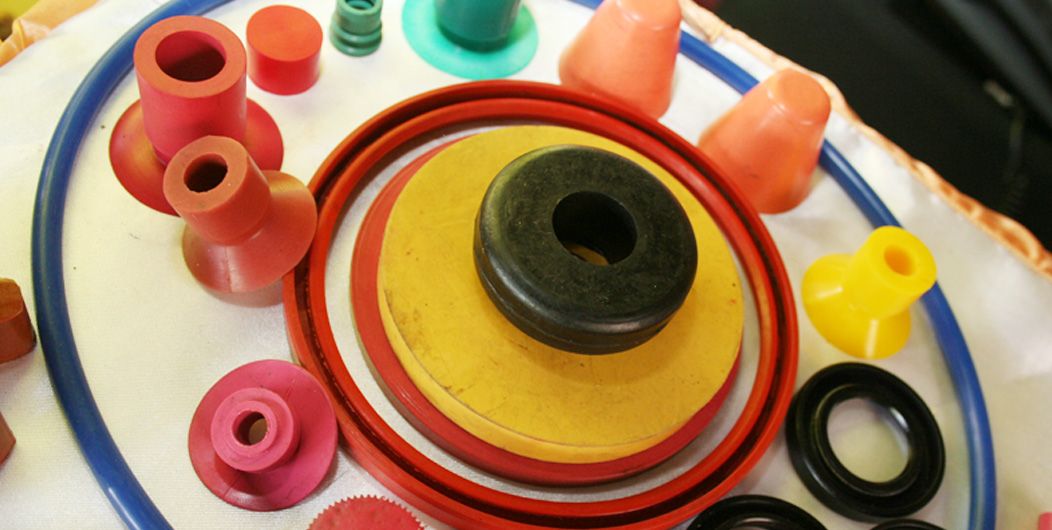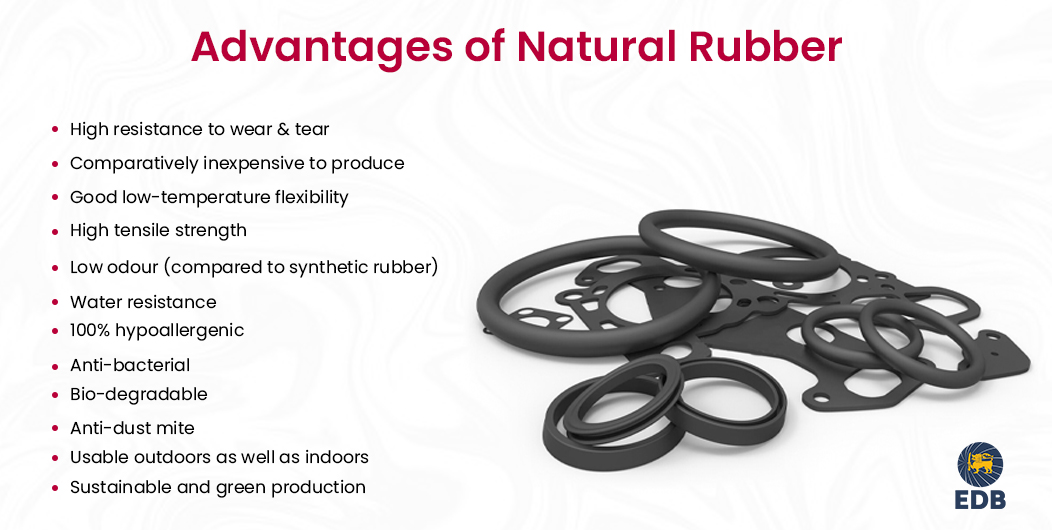
For decades, rubber alongside tea and coconut has been an important commercial crop in Sri Lanka both for export and for domestic consumption purposes. In 2020, Sri Lanka exported rubber & rubber-based products worth US$786 million and aims to gain US$2 billion in rubber export earnings by 2025. Among the rubber-based products manufactured and exported from Sri Lanka, moulded rubber products are an important category.
Rubber moulding is a moulding process for the manufacture of usable rubber products. Rubber products are made from uncured rubber or elastomers. An elastomer is any material with sufficient resilience or memory for returning to its original shape in response to pressure or distortions. Rubber and elastomers can be obtained from natural sources even though they are largely synthetic and produced through highly controlled chemical processes. Rubber is a perfect material for situations that require a material to expand and return to its original shape.
Rubber moulding produces moulded rubber parts by pressing a block of rubber into a rubber moulding metal cavity. The rubber is then exposed to heat, triggering a chemical reaction. Whereas there are variations in specific methods adopted, all rubber manufacturers use heat and pressure methods to manufacture moulded rubber products. The three most common methods in the rubber moulding process are rubber injection moulding, compression moulding, and transfer moulding.
Moulded rubber seals are used in many industries to prevent the unwanted leakage of liquids and gases in numerous components such as pumps, valves, pipe fittings, and vacuum seals, among many others. Not all rubber seals are created equally, however. So, the manufacture of rubber seals essentially involves several major design considerations such as dimensional requirements, temperature, pressure, friction, and chemical compatibility.
There Are different types of rubber seals used for different manufacturing requirements. Shaft seals are designed to seal the ends of shafts, whereas O-rings create a seal when under pressure. Sri Lanka is a good sourcing destination for rubber seals of all types
A gasket is meant to form a mechanical seal that fills the space between less-than-perfect mating surfaces. It prevents leakage from, or into, the joined objects while under compression. Rubber gaskets are used primarily to prevent leaks of gas or liquid, but they can be used as a barrier between two objects, such as two metals or chemicals.
They’re often used as protection against outside elements as well. In a camera lens, for instance, they combat moisture and dust to ensure that the lens stays focused and speck-free. Used in almost every industry, this fabricated rubber product is versatile and essential for thousands of applications. It’s very seldom that two applications use gaskets of the same shape and size. In other words, each type of gasket is manufactured for a specification application or requirement.
Better known by its brand name - Neoprene, Chloroprene is the first synthetic rubber. It’s extremely versatile and can be used in harsh environments because it offers strong resistance to oil and other petroleum solvents. Neoprene is both noteworthy and popular for its durability against elemental forces.
Silicone is known as a high-performance rubber, and it is often used in products that are exposed to extremely high or low temperatures. Silicone’s flexibility at temperatures as low as -75 degrees Fahrenheit is unmatched by any other type of rubber, so it's a common material used in gaskets at research facilities in the Arctic.
EPDM (Ethylene Propylene Diene Monomer) rubber is one of the most popular and versatile rubbers available today. It’s highly resistant to sunlight and extreme heat, and it fights to age very well. It also helps to stabilise colour even through harsh weather conditions, so it’s a popular choice for outdoor equipment.
You can source a wide range of rubber gaskets made to custom specifications from Sri Lankan rubber gasket suppliers.
A rubber roller is a machine component that is made up of an inner round shaft or tube covered by an outer layer of elastomer compounds. The inner shaft is made of steel, aluminium alloys, or other strong and rigid material composites. The outer layer, in contrast, is typically fashioned from a polymer such as polyurethane, silicone, EPDM, neoprene, and natural rubber. Rubber rollers are used in different manufacturing processes for performing operations such as:
Source a wide range of high-quality rubber rollers made in Sri Lanka to custom specifications from Sri Lankan rubber roller suppliers.
Rubber diaphragms are flexible seals that prevent unwanted transmission of substances such as liquid, gasses or solutions between two places. Rubber diaphragms are essential to flow control applications. The flat rubber diaphragm sheet is usually manufactured with natural rubber or synthetic rubber compounds such as Neoprene, Nitrile, EPDM, Butyl, Fluorocarbon, Silicone, or NBR-PVC and reinforcing fabrics. Diaphragms of different types and sizes are heavily used in many industries such as Engineering Industry, Steel industry, Irrigation & Water supply, Pumps & Valves Industry, Pharmaceutical industry, Sugar Industry, Chemical industry, Transportation industry, Petrochemicals & Refining industry, Power generation industry, Fertilizer industry, etc.
These rubber diaphragms are made of rubber, rubber-fabric combinations, and speciality materials.
These are classic rubber diaphragms made to custom specifications
These rubber diaphragms are resistant to many chemicals at different pressure ranges. These are movable between two components through a dividing membrane. These are mainly used for:
These diaphragms are made specifically based on the requirements given by the customers. The moulded diaphragms are manufactured to withstand the high pressure that is applied to them during their application.
Some of the most common uses of rubber diaphragms include:
Source a wide range of high-quality rubber diaphragms made in Sri Lanka to custom specifications from Sri Lankan rubber roller suppliers.
Rubber pet bowls are yet another rubber product manufactured and exported from Sri Lanka. These are highly resistant to cracking and cold weather and durable with no room for bruising, twisting, chipping, breaking, or rusting. Also, they're considered safe for domestic pets. You can source a whole range of natural rubber and silicone pet bowls from Sri Lanka.
Source a wide range of high-quality rubber diaphragms made in Sri Lanka to custom specifications from Sri Lankan rubber roller suppliers.

The rubber industry is one of the most developed and robust industries in Sri Lanka manufacturing product varieties from apparel and tires to raw rubber, rubber sheets, with the best quality guarantee from the exporters.
Rubber & Rubber Based Products
Info
Directory
eMARKETPLACE
Synthetic Rubber
Directory
eMARKETPLACE
Rubber Finished Products
Directory
eMARKETPLACE
Info
Directory
eMARKETPLACE